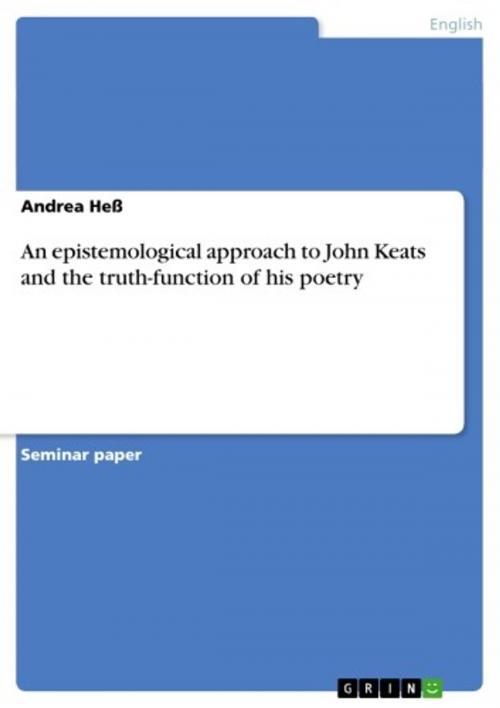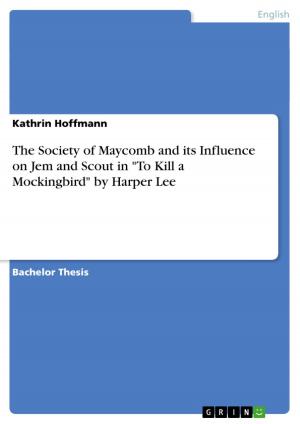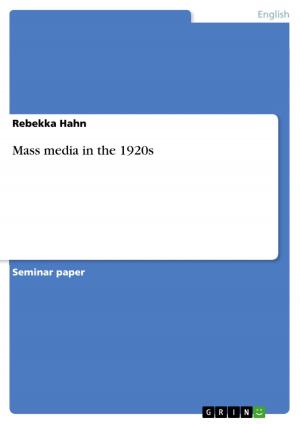An epistemological approach to John Keats and the truth-function of his poetry
Fiction & Literature, Literary Theory & Criticism, British| Author: | Andrea Heß | ISBN: | 9783638424929 |
| Publisher: | GRIN Publishing | Publication: | October 8, 2005 |
| Imprint: | GRIN Publishing | Language: | English |
| Author: | Andrea Heß |
| ISBN: | 9783638424929 |
| Publisher: | GRIN Publishing |
| Publication: | October 8, 2005 |
| Imprint: | GRIN Publishing |
| Language: | English |
Seminar paper from the year 2005 in the subject English Language and Literature Studies - Literature, University of Augsburg (Englische Literaturwissenschaft), course: John Keats, 20 entries in the bibliography, language: English, abstract: 'Negative Capability' is a concept coined by the Romantic poet John Keats, as put down in a letter his brothers1, discussed and interpreted by scholars over and over again. On one hand it provides a desirable quality every poet should be in possession of, on the other hand it is to hold the almost presumptuous ability to solve - alongside imagination- the huge epistemological challenges of subject- object- relation and the constitution of reality. Even though Keats himself didn't write any explicit work on his literary theory or poetical concept, his approach to poetry and its aesthetic function can be traced back in his poems and letters. There he openly addresses his attitudes as they are also expressed, sometimes between the lines, throughout his poetry. Only it seems that Keats changed his notions and ideas at times, some of his convictions can rather be seen as temporary spots of light in the ongoing process of the pursuit of knowledge than a real enlightenment. This actually mirrors Keats's statement s about the acquisition of knowledge in a very precise way; that this whole task was enveloped in fuzz and uncertainty, where truth appeared in sparks of epiphany but could never be considered full and complete, absolute knowledge. It is thus enclosed in a developing process that leads ever higher and forwards to a state of further and deeper understanding. In this paper I am going to approach Keats's ways and convictions in the search for knowledge and will take up the challenge of placing him in regard to his epistemology and closely related aesthetic theory. First of all I am going to work out in how far Keats can be understood as an heir of his time. How was he to understand and write about a world that had just been shaken by hopes and disappointments of the French Revolution that brought about a whole new concept of liberty, rights of the individual and anti- dogmatism? I will also show how his scepticism is a direct reaction to and consequent continuation of Enlightenment that worshipped the idealized intellect and reason. When considering the socio- cultural context in which Keats grew up, I hold it important to touch upon the philosophical theories of his time; mainly German Idealism had a great impact of thought in theses decades, whether Keats had read them (which can be doubted2) and had been conscious of their influence or not.
Seminar paper from the year 2005 in the subject English Language and Literature Studies - Literature, University of Augsburg (Englische Literaturwissenschaft), course: John Keats, 20 entries in the bibliography, language: English, abstract: 'Negative Capability' is a concept coined by the Romantic poet John Keats, as put down in a letter his brothers1, discussed and interpreted by scholars over and over again. On one hand it provides a desirable quality every poet should be in possession of, on the other hand it is to hold the almost presumptuous ability to solve - alongside imagination- the huge epistemological challenges of subject- object- relation and the constitution of reality. Even though Keats himself didn't write any explicit work on his literary theory or poetical concept, his approach to poetry and its aesthetic function can be traced back in his poems and letters. There he openly addresses his attitudes as they are also expressed, sometimes between the lines, throughout his poetry. Only it seems that Keats changed his notions and ideas at times, some of his convictions can rather be seen as temporary spots of light in the ongoing process of the pursuit of knowledge than a real enlightenment. This actually mirrors Keats's statement s about the acquisition of knowledge in a very precise way; that this whole task was enveloped in fuzz and uncertainty, where truth appeared in sparks of epiphany but could never be considered full and complete, absolute knowledge. It is thus enclosed in a developing process that leads ever higher and forwards to a state of further and deeper understanding. In this paper I am going to approach Keats's ways and convictions in the search for knowledge and will take up the challenge of placing him in regard to his epistemology and closely related aesthetic theory. First of all I am going to work out in how far Keats can be understood as an heir of his time. How was he to understand and write about a world that had just been shaken by hopes and disappointments of the French Revolution that brought about a whole new concept of liberty, rights of the individual and anti- dogmatism? I will also show how his scepticism is a direct reaction to and consequent continuation of Enlightenment that worshipped the idealized intellect and reason. When considering the socio- cultural context in which Keats grew up, I hold it important to touch upon the philosophical theories of his time; mainly German Idealism had a great impact of thought in theses decades, whether Keats had read them (which can be doubted2) and had been conscious of their influence or not.















